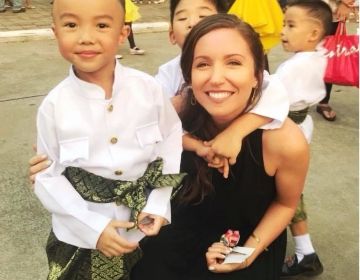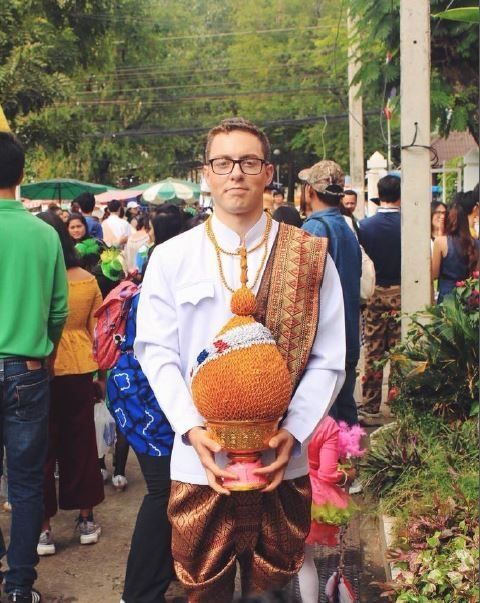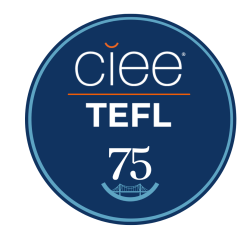Destination TEFL Thailand - What life is really like
This week we spoke with Matt B., a Destination TEFL Thailand alumni turned full time teacher! Matt is currently teaching in Thailand at a school in Khon Kaen. Read more about his experience in Thailand!
Q: Can you tell us a little bit about what you were doing before you got TEFL certified with CIEE?
A: I studied finance in college and had worked for two years in Connecticut and then Maine. Thinking back on my experience studying abroad in Spain during college, I realized I wanted to have the experience of living abroad again sooner rather than later. I wanted to see more of the world before I settled down in a long-term career in the United States.
Q: What inspired you to get TEFL Certified, then teach abroad?
A: My time studying in Spain definitely had an influence, and made me want to spend more time abroad. I also worked as a camp counselor when I was younger, and I loved working with kids. I’ve always loved anything involving languages—so teaching English abroad really made sense for me.
Q: What drew you to Thailand specifically?
A: I had done some research and Thailand kept coming up. I saw that my transition after completing my two week practicum on Destination TEFL would be easier in Thailand—there were a plethora of teaching jobs available and a large expat community to use as a resource and eventually join.
Q: What pieces of advice would you give to someone considering teaching abroad?
A: I would definitely say to make sure you have a passion for teaching, and that your idea of the experience isn’t all about travelling. Traveling is a huge bonus, and of course living in a new culture and experiencing new things is part of the draw of the job, but at the end of the day, it is a job, and you can’t leave your teaching responsibilities on the backburner. If you just want to see the world, there are definitely other ways to achieve that goal.
Q: What are the biggest challenges you face as a foreigner living and working in Thailand?
The biggest one is definitely “Thai Time.” In America, we are very accustomed to timeliness and efficiency, but here, those things are not as important culturally. The best thing to do is to go with the flow and not get frustrated. There are a lot of cultural differences, and they can be pretty vast and sometimes hard to navigate, but the best thing to do is to be present and accept them as part of the overall experience.
Q: What is your experience of budgeting and money management living abroad?
A: Definitely make sure you set yourself up well before you leave. Most teachers go over budget in their first month as they familiarize themselves with their new location, income, etc. You probably won’t end up saving as much as you think you will, and sending money home can be difficult due to work permit requirements to open bank accounts and other restrictions. Doing things like getting your student loans adjusted for your income as a teacher can make a huge difference in the financial outlook for teach abroad.
Q: How are you finding the people in Thailand? Your students?
A: Thailand is truly the land of smiles. Everyone is so friendly and polite. Being in a new culture and learning so much every day is really incredible. My students are amazing, and while dealing with them requires a lot of energy, they make all the effort worthwhile. It’s definitely a humbling and awesome experience overall.
Q: Do you find it difficult to socialize? Who do you hang out with outside of work?
A: I have a pretty robust social life with plenty of friends, both Thai and foreign. If you’re the least bit social and outgoing then you’ll meet people that you can connect with. That said, I live in a large city of 300,000-400,000 people that has many schools, and two big universities so there’s no shortage of young people and nightlife etc. If you’re in a very small, very rural area, then you might need to go out and really actively try to meet new people. Sort of like you would if you moved to a small town in the US, it won’t just fall into your lap.
Q: What do you do in your free time?
Exercise is a great way to use your time and maintain a good mental state. Planning trips and learning the language will also go a long way in helping you make the most of your time abroad. A lot of people like to play soccer, or tennis, and going out and finding cool restaurants as always fun as well. Keeping in touch with people at home is also very important, and can help when you’re feeling homesick.
Q: What was the biggest advantage of doing Destination TEFL before you started your job?
The actual journey to Thailand was much more doable. I was going with a group, and spending two weeks being guided through my practicum experience and being introduced to Thai culture. I also felt so much more confident and prepared for the job on day one, having gotten TEFL certified.
Q: What made you choose Khon Kaen over a larger city like Bangkok?
A: It’s really the ideal balance of urban and rural Thailand. Bangkok is bigger and has more going on, but it’s also much more hectic and expensive. Khon Kaen has less tourists, which I prefer, and living there makes me feel more like I’m more purely immersed in Thai culture.
Q: What advice would you give to newly-arrived teachers in their first couple of weeks or months on the job?
A: All you can do is try your best for the kids you’re responsible for. There will be flaws in any system, so be easy-going and try not to let frustrations get to you. You probably won’t change the entire system as one person, so the important thing is to focus on what’s in front of you—your kids and your classroom.
Q: What are your plans for the near-future?
I’m teaching for one more semester here and then returning the U.S. to further pursue my education in finance. If it weren’t for my desire to go back to school, I’d probably either stay here in Thailand or try to teach somewhere else.
Q: Any final words of wisdom for those considering teaching abroad?
A: A few things!
I’d say, it’s important to make sure you’re OK with living on your own/out of your comfort zone. Living alone, especially in a distinctly foreign environment, can present challenges that might be new to you: don’t be afraid to consider the possibility that you’ll run into scenarios you haven’t encountered before!
Do it for the right reasons. Don’t just sign up for Teach Abroad as a quick way to get cash while you travel. You are there for the kids first and your travel goals second, so always remember that when you consider teaching abroad.
Don’t get too wound up over the education system. It’s not your job to fix everything and there’s only so much you can do. That said, do your best so that your students get the most of what you can give them.
Thanks again to Matt for taking the time to share his experience with us!!
Related Posts
The Funeral
I did it, I made it to the eve of my first weekend as an official teacher here in Thailand. Sitting in the English teachers’ office packing up for the... keep reading
It's Really Happening
10/23/18 @ 2:37 PM I'm in the back of a school van headed East to my new city, Chachoengsao, Thailand. My stomach's in knots and I feel like I'm going... keep reading

5 Reasons to Get TEFL Certified - Insight from a former corporate recruiter.
After 5 years working in corporate I could no longer ignore my love for travel and adventure. I discovered CIEE’s Teach In Thailand program through a former colleague and knew... keep reading

